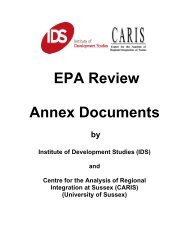The Impact of Energy Use on Poor Urban Livelihoods in ... - DfID
The Impact of Energy Use on Poor Urban Livelihoods in ... - DfID
The Impact of Energy Use on Poor Urban Livelihoods in ... - DfID
You also want an ePaper? Increase the reach of your titles
YUMPU automatically turns print PDFs into web optimized ePapers that Google loves.
A Study <str<strong>on</strong>g>of</str<strong>on</strong>g> the <str<strong>on</strong>g>Impact</str<strong>on</strong>g> <str<strong>on</strong>g>of</str<strong>on</strong>g> <str<strong>on</strong>g>Energy</str<strong>on</strong>g> <strong>on</strong> <strong>Poor</strong> <strong>Urban</strong> <strong>Livelihoods</strong> <strong>in</strong> Arusha, Tanzania<br />
Box F: Reas<strong>on</strong>s for women's greater poverty<br />
outdated customs and and culture are not friendly to women (ie. do not own<br />
property);<br />
higher levels <str<strong>on</strong>g>of</str<strong>on</strong>g> illiteracy (although this was not borne out by the data for Kaloleni<br />
and Daraja Mbili from the 2002 N<strong>on</strong>-Formal Educati<strong>on</strong> Survey);<br />
not <strong>in</strong>volved <strong>in</strong> decisi<strong>on</strong>-mak<strong>in</strong>g;<br />
they spend their <strong>in</strong>comes <strong>on</strong> family needs;<br />
they have no command over the <strong>in</strong>come they generate;<br />
they use poor equipment <strong>in</strong> their activities;<br />
lack <str<strong>on</strong>g>of</str<strong>on</strong>g> freedom <str<strong>on</strong>g>of</str<strong>on</strong>g> movement due to c<strong>on</strong>f<strong>in</strong>ement by their husbands;<br />
they are not able to secure employment because <str<strong>on</strong>g>of</str<strong>on</strong>g> illiteracy and lack <str<strong>on</strong>g>of</str<strong>on</strong>g> skills.<br />
Source: Participatory Poverty Assessment Study 2001<br />
C.6 <str<strong>on</strong>g>Energy</str<strong>on</strong>g><br />
C.6.1 Nati<strong>on</strong>al <str<strong>on</strong>g>Energy</str<strong>on</strong>g> Policy<br />
Tanzania's <strong>in</strong>itial Nati<strong>on</strong>al <str<strong>on</strong>g>Energy</str<strong>on</strong>g> Policy (NEP) which was formulated <strong>in</strong> 1992 was<br />
updated <strong>in</strong> 2003. <str<strong>on</strong>g>The</str<strong>on</strong>g> new policy aims to establish ‘an efficient energy producti<strong>on</strong>,<br />
procurement, transportati<strong>on</strong>, distributi<strong>on</strong> and end-use systems <strong>in</strong> an envir<strong>on</strong>mentally<br />
sound and susta<strong>in</strong>able manner and with due regard to gender issues’ 39 .<br />
While the new policy recognizes the relati<strong>on</strong>ship between energy and poverty and<br />
energy and gender it fails to <strong>in</strong>corporate strategies for achiev<strong>in</strong>g desired changes.<br />
Specifically <strong>in</strong> the household energy sector, it acknowledges that the high cost <str<strong>on</strong>g>of</str<strong>on</strong>g><br />
commercial energy and the related appliances is a major c<strong>on</strong>stra<strong>in</strong>t for the poor. It<br />
also recognises the need to change prevail<strong>in</strong>g <strong>in</strong>efficient practices <strong>in</strong> energy use.<br />
<str<strong>on</strong>g>The</str<strong>on</strong>g> major focus <strong>in</strong> terms <str<strong>on</strong>g>of</str<strong>on</strong>g> energy supply is <strong>on</strong> rural and semi-urban women,<br />
although a broader approach to gender issues is iterated as a cross cutt<strong>in</strong>g strategy<br />
<strong>in</strong> all sectors. Box G highlights specific policy statements relat<strong>in</strong>g to the household<br />
sector.<br />
<str<strong>on</strong>g>The</str<strong>on</strong>g> NEP gives extensive c<strong>on</strong>siderati<strong>on</strong> to the rural energy problematic but apart from<br />
some generalised statements relat<strong>in</strong>g to the demand for energy and crosscutt<strong>in</strong>g<br />
issues relat<strong>in</strong>g to energy, set out <strong>in</strong> Box G, it makes little reference to urban needs<br />
and supply. As will be seen from detailed c<strong>on</strong>siderati<strong>on</strong> <str<strong>on</strong>g>of</str<strong>on</strong>g> fuel supply below, the GoT<br />
divests its resp<strong>on</strong>sibility to the private sector <strong>in</strong> urban areas.<br />
C.6.2 Nati<strong>on</strong>al energy supply and demand<br />
Tanzanian energy usage comprises:<br />
Wood & biomass: 90%<br />
Petroleum products: 8%<br />
Electricity: 1.2 - 2%<br />
Coal & renewable energy: approx. 1% 40<br />
<str<strong>on</strong>g>The</str<strong>on</strong>g> domestic sector is the largest energy c<strong>on</strong>sumer.<br />
39<br />
Nati<strong>on</strong>al <str<strong>on</strong>g>Energy</str<strong>on</strong>g> Policy, 2003 p.1<br />
40<br />
Key Informant Interview, Assistant Commissi<strong>on</strong>er, M<strong>in</strong>istry <str<strong>on</strong>g>of</str<strong>on</strong>g> <str<strong>on</strong>g>Energy</str<strong>on</strong>g> and M<strong>in</strong>erals<br />
Development Plann<strong>in</strong>g Unit, UCL L<strong>on</strong>d<strong>on</strong><br />
Dr. Sheilah Meikle and Patrice North
















